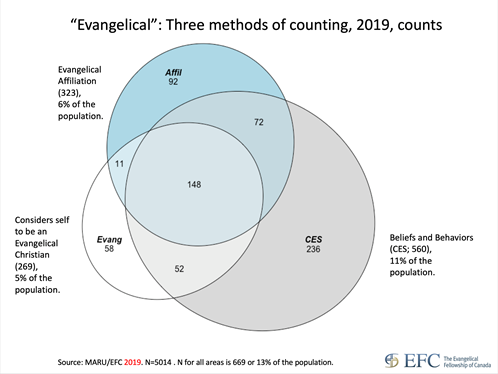A major new EFC survey suggests half of Canadians are either agnostic, atheist or unreligious. And only a tenth attend religious services weekly. How will the church respond?
The
2019 Church and Faith Trends Survey was conducted with 5,011 Canadians over the age of 18 August 12–16, 2019 on the
Maru/Blue research panel. The survey was conducted in English and French.
A detailed introduction to the survey and its results is included in the Jan/Feb 2020 issue of
Faith Today magazine. Four pages are
available free online, and four additional pages of reflection are only available to subscribers.
This 2019 survey is a tracking poll on church and faith trends that builds on ones that the EFC and its partners have done in 2003, 2007, 2013 and 2015. Common to all these surveys is a set of 8 questions that make up the Christian Evangelical Scale (CES).
The CES is a way to track evangelical alignment in Canada over time developed by Maru/Blue pollster Andrew Grenville. (It is based on scholar David Bebbington’s four peculiar emphases for evangelical Christians including Biblicism, Crucicentrism, Activism and Conversionism. See Bebbington’s
Evangelicalism in Modern Britain: A History from the 1930s to the 1980s pages 1-19 and Appendix A in “
Evangelical Alignment in Canada” for more.)
Every kind of measurement has its own limitations. Public opinion polling has its limitations, but so do individual questions or sets of questions. To better find “Evangelicals,” in addition to the CES questions we also asked questions about affiliation and whether respondents consider themselves to be Evangelical Christians. So, our three measures were:
- Evangelical Alignment: Do they score 28 or higher on the Christian Evangelical Scale?
- Affiliation: Are they affiliated with a church within the evangelical tradition?
- Evangelical self-identity: Do they consider themselves to be an Evangelical Christian?
Chart 1, below, shows the how 2019 survey respondents answered these three questions. A future article will look compare the populations represented by the different areas on this chart. For now, we will observe the following:
- The evangelically aligned are about 11% of the population.
- Evangelical affiliates are about 6% of the population.
- Those who consider themselves to be Evangelical Christians are about 6% of the population.
- The combination of all these groups represent about 13% of the population.

The complete list of survey questions are available as PDFs (
English,
French). Check back to this page for forthcoming articles based on the 2019 survey data on these and other topics:
- Tolerance. Results on this topic were part of a public presentation by Dr. Sam Reimer (March 10, 2020)
- Who is an “Evangelical”?
- Bible engagement
- A religious profile of gamers
- Canadian’s belief in a bodily resurrection.
A good place to start is the four-page introduction
available free online from
Faith Today magazine. You can also read more about evangelicalism in Canada on the EFC's
About Evangelicals webpage.